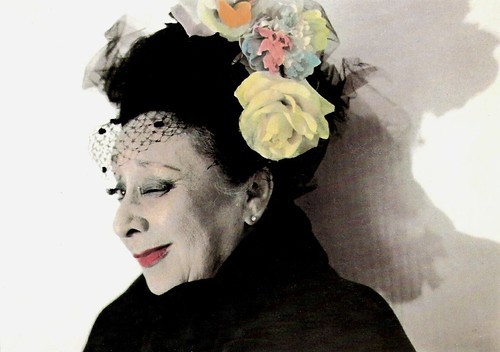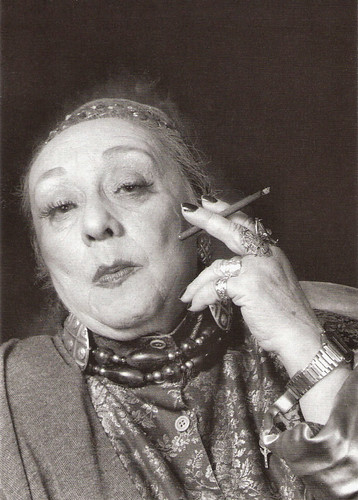
German postcard by Edition Wild, Waldbröl. Photo: Gertrude Garancy. Colouring: Cesa, 1990.
Rassenschande
Lotti Huber was born Charlotte Dora Goldmann (according to IMDb as Regina Rudnick) in Kiel, Germany in 1912. She was the daughter of upper-class Jewish parents and grew up with two brothers, Walter and Kurt (later Ruwen Golan).
As a young girl, she became interested in dance and theatre and took lessons. She was inspired by modern dancers like Isadora Duncan and Mary Wigman. With her lover Hillert Lueken, the son of former Kiel Mayor Emil Lueken, she went to Berlin and lived there with him. Since Lotti was Jewish, Hillert Lueken was arrested and killed by the Nazis in 1937 because of ‘Rassenschande’ (race defilement).
She was deported to the Moringen concentration camp and after its dissolution to the Lichtenburg concentration camp. In 1938, through her brother Kurt's commitment she was bought out by a US organization. She went to Haifa in Palestine in exile. She studied dance and mime and moved with her first husband, British officer Alec Kingaby, through the Middle East. She worked as a dancer in nightclubs and vaudeville. They settled in Cyprus and opened a hotel in Nicosia.
After their divorce, Lotti moved to Kyrenia, a port city in northern Cyprus, and ran her own restaurant ‘The Octopus’. There she met her second husband Norman Huber, also a British officer, in 1960. The couple moved to London, and in 1965, Lotti returned to Berlin when Norman was transferred to the Federal Republic of Germany.
After the death of her husband in 1971, Huber had to get by with odd jobs. So she translated romance novels from English, opened an etiquette school in her apartment, sold herb liquor in department stores and worked as a film extra in such films as Schöner Gigolo, armer Gigolo/Just a Gigolo (David Hemmings, 1979) starring David Bowie, Die Alptraumfrau/Nightmare Woman (Lothar Lambert, 1981) and the Thomas Mann adaptation Der Zauberberg/The Magic Mountain (Hans W. Geißendörfer, 1982).

German postcard by L.M. Kartenvertrieb, Berlin, no. 01916. Photo: Wilhelm L. Reinke.
Adventurous and outrageous
In 1981, Lotti Huber became known to cinema audiences with Unsere Leichen leben noch/Our Corpses Still Live, directed by the adventurous and outrageous filmmaker Rosa von Praunheim. It made her the diva of Von Praunheim’s cult cinema and she returned in his next films like Stadt der verlorenen Seelen/City of Lost Souls (Rosa von Praunheim, 1983) and Horror Vacui (Rosa von Praunheim, 1984).
She co-wrote the screenplay and took a starring role in Anita - Tänze des Lasters/Anita - Dances of Vice (Rosa von Praunheim, 1988), on the life and career of silent film star and nude dancer Anita Berber.
In 1990, Huber published her autobiography, 'Diese Zitrone hat noch viel Saft! Ein Leben' (This lemon still has a lot of juice! A life). Her best-known film is the semi-documentary Affengeil. Eine Reise durch Lottis Leben (Rosa von Praunheim, 1991).
By now, she was considered the star of the Berlin Underground and had a large following, especially in the gay and lesbian scene. Huber stepped on with solo programs, biographical narratives, dance, cabaret and chanson joined together. She regularly appeared in the TV show Holgers Waschsalon/Holger's Launderette and other TV programmes.
In later years, she worked with Thom Nowotny as her musical companion, and together they had a television show on the local station TV Berlin. She continued to appear in films like the mockumentary Neurosia – 50 Jahre pervers/Neurosia - Who Shot Rosa von Praunheim (Rosa von Praunheim, 1995) and the TV-production Liebling, vergiss die Socken nicht!/Darling, Do Not Forget the Socks! (Tobias Meinecke, 1998). It was her final film appearance. In 1998, Lotti Huber died of heart failure and was buried at the Jewish cemetery Heerstraße in Berlin, next to her husband Norman Huber.
Sources: Rena Jacob (Wider des Vergessens - Now defunct), Wikipedia (German), and IMDb.
This post was last updated on 26 October 2024.
No comments:
Post a Comment